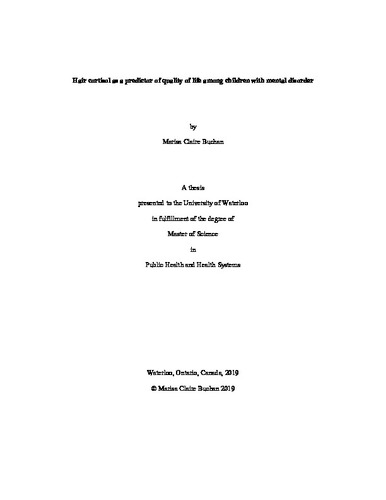| dc.contributor.author | Buchan, Marisa Claire | |
| dc.date.accessioned | 2019-04-08 19:06:35 (GMT) | |
| dc.date.available | 2019-04-08 19:06:35 (GMT) | |
| dc.date.issued | 2019-04-08 | |
| dc.date.submitted | 2019-04-02 | |
| dc.identifier.uri | http://hdl.handle.net/10012/14516 | |
| dc.description.abstract | Children living with mental disorder are at risk for lower health-related quality of life (HRQoL) than their healthy peers. Although hair cortisol concentration (HCC) is found to be elevated among individuals subjected to chronic stress, blunted HCC levels are associated with mental disorders in children. Understanding ways in which mental disorder translates into psychosocial outcomes will help to inform the development of effective interventions and services tailored to specific populations.
This study aimed to determine whether physiological stress was associated with HRQoL in children with mental disorder. Data from 100 children, aged 4-17 years, was collected from tertiary care clinics in south-western Ontario, Canada. The Mini International Neuropsychiatric Interview for Children and Adolescents was administered to measure the presence of eight common mental disorders in childhood; the KIDSCREEN-27 was used to assess HRQoL across five domains, and cortisol was extracted from hair samples collected from children a standard ELISA procedure. Multiple regression analyses were conducted to test the association between HCC and HRQoL.
Results demonstrated that there were no differences in HCC across type of mental disorder, child age, or sex. High HCC was significantly associated with low parent-reported psychological wellbeing HRQoL [β=-0.17; CI: -0.34, -0.00] and school environment HRQoL [β=-0.25; CI=-0.48, -0.03]. The presence of a chronic physical condition and high parental stress scores were found to moderate the relationship between HCC and HRQoL in the domains of peers and social support [β=-0.79; CI=-1.30, -0.28] and physical well-being [β=-0.01; CI=-0.03,-0.00] respectively. These results demonstrate that high HCC is associated with lower reports of HRQL in children with mental disorder. Furthermore, the presence of a physical illness and environments high in parental stress augment the nature of the association between HCC and HRQoL. Thus, approaches that reduce stress and increase coping in children with mental disorder may be helpful in promoting optimal well-being. This study provides compelling evidence that supports the need for further investigation into the links between physiological stress and psychosocial outcomes in children with mental disorder. | en |
| dc.language.iso | en | en |
| dc.publisher | University of Waterloo | en |
| dc.subject | Cortisol | en |
| dc.subject | hair | en |
| dc.subject | children | en |
| dc.subject | mental disorder | en |
| dc.subject | quality of life | en |
| dc.title | Hair cortisol concentration as a predictor of quality of life among children with mental disorder | en |
| dc.type | Master Thesis | en |
| dc.pending | false | |
| uws-etd.degree.department | School of Public Health and Health Systems | en |
| uws-etd.degree.discipline | Public Health and Health Systems | en |
| uws-etd.degree.grantor | University of Waterloo | en |
| uws-etd.degree | Master of Science | en |
| uws.contributor.advisor | Ferro, Mark | |
| uws.contributor.affiliation1 | Faculty of Applied Health Sciences | en |
| uws.published.city | Waterloo | en |
| uws.published.country | Canada | en |
| uws.published.province | Ontario | en |
| uws.typeOfResource | Text | en |
| uws.peerReviewStatus | Unreviewed | en |
| uws.scholarLevel | Graduate | en |

